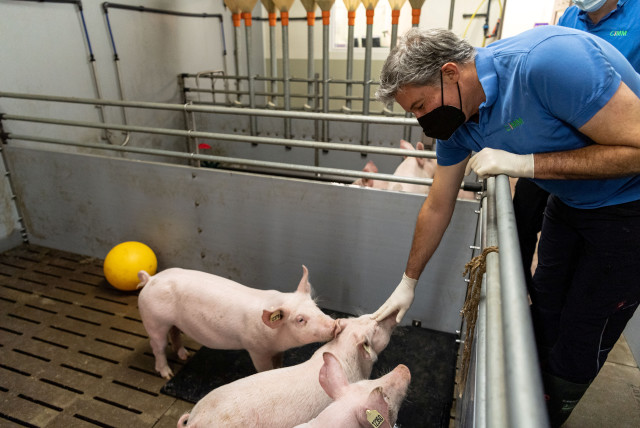Animal rights activists protest animal testing in Israel with dead piglets

In 2021, 3,607 permits were issued by the Health Ministry to conduct testing on animals in Israel.
Animals rights activists wearing bloodied lab coats protested against animal testing by holding dead piglets in front of a lab that reportedly conducts animal testing on Sunday ahead of the World Day for Laboratory Animals which takes place on April 24.
The protest was organized by the Freedom For Animals and Israel Pig Save organizations and took place in front of the Shamir Medical Center (Assaf Harofeh).
The organizations argue that animal testing causes harm to animals without providing reliable results, citing Dr. Elad Feigin, a pediatric surgeon, and Dr. Werner Hartinger, a specialist in general and accident surgery with over 30 years of experience, who both advocated against animal testing.
"Anyone who trusts animal experiments and immediately afterward wants to use the preparation on my child or other children is a dangerous person," said Feigin in the past. Hartinger stated in past statements that "experiments on animals are barbaric, useless and an obstacle to scientific progress. I learned how to operate from other surgeons. This is the only way, and every good surgeon knows it."
"Animal experiments are the pinnacle of cruelty that humans commit towards animals. In these experiments, [researchers] perform invasive surgeries, sometimes without anesthetics and sedation, [as well as] burning, poisoning, breaking limbs and more," said Yehonatan Lake, one of the activists who took part in the protest.
Activists argue animal tests produce faulty data
The organizations noted a number of incidents in which animal testing produced faulty results, including the failure of HIV vaccines which have worked on animals but failed in humans and the death of 140,000 people around the world from 1999-2004 (45 deaths per day) who took the anti-inflammatory drug Vioxx which was approved by the FDA after it tested safe in African green monkeys and other animal species.
An article by Animal Free Research UK in the Animals journal noted that over 92% of drugs that show promise in animal tests fail to reach patients, mainly due to problems with efficacy and safety that were not predicted by the animal tests.
In January, a new law in the US partially lifted the FDA requirement that pharmaceutical companies use animals to test new drugs before human trials, although it did not ban such tests and did not require the FDA to approve a drug that was not tested on animals.
The animal rights organizations published a petition on Sunday calling on the Shamir Medical Center to stop animal testing. As of Monday morning, 112 people had signed the petition.
The Shamir Medical Center's research and development unit, including a goat and sheep farm and veterinary labs used for animal testing, has been accredited by the Israel Good Laboratory Practice (GLP) Compliance Monitoring Unit and found to be in compliance with the OECD Principles of Good Laboratory Practice.
The medical center stated in response to the protest that "the Shamir Medical Center is at the forefront of research and all the research conducted here is in accordance with the standards used in Israel and the world."
3,607 permits for animal testing issued in 2021 in Israel
In 2021, 3,607 permits were issued in Israel to conduct testing on animals, with about half of the studies aimed at promoting scientific research and the other half of the studies aimed at promoting health and medicine, according to data by the Health Ministry's Council for Experiments of Animal Subjects.
The council grades the risk of pain and suffering that could be caused by studies on a scale ranging from 1 to 5, with five being the highest risk and one being the lowest risk. Of the studies approved in 2021, half of them were rated a four or five on that scale. Only 23.5% were rated in the bottom two levels of risk.
In an effort to avoid harm to animals, a research fund of the Health Ministry finances research grants for the development of alternative methods to conduct tests without using animals, with 15 such projects funded as of mid-2021. Last year, the Health Ministry and Science Ministry published a tender for projects aimed at reducing the use of animals for studies.
Jerusalem Post Store
`; document.getElementById("linkPremium").innerHTML = cont; var divWithLink = document.getElementById("premium-link"); if (divWithLink !== null && divWithLink !== 'undefined') { divWithLink.style.border = "solid 1px #cb0f3e"; divWithLink.style.textAlign = "center"; divWithLink.style.marginBottom = "15px"; divWithLink.style.marginTop = "15px"; divWithLink.style.width = "100%"; divWithLink.style.backgroundColor = "#122952"; divWithLink.style.color = "#ffffff"; divWithLink.style.lineHeight = "1.5"; } } (function (v, i) { });

